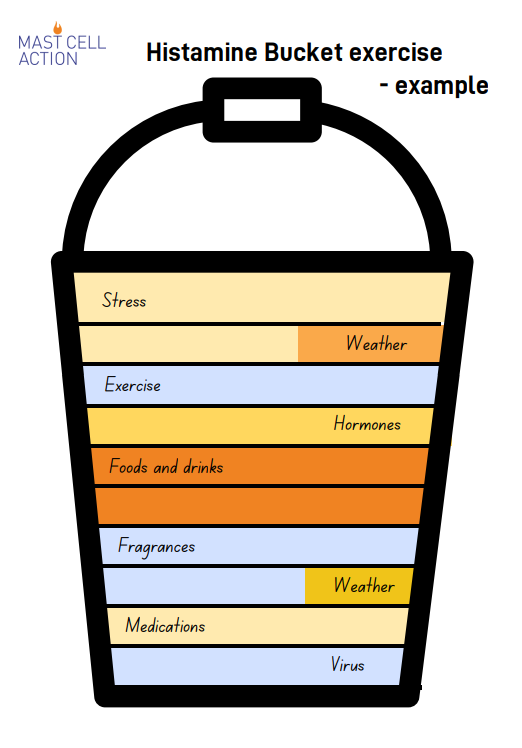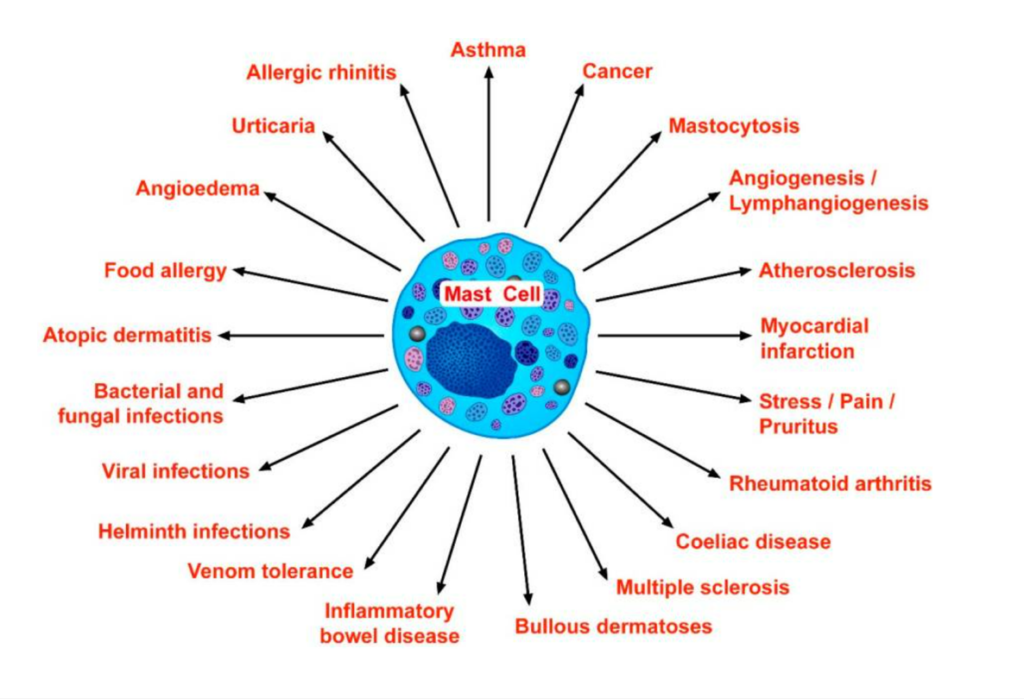mast cell activation disorder (mcas)
Mast cells are part of your immune system and have an important role to play but if they are activated, release over 1000 mediators (chemicals) to warn you there is something wrong and the results are not pleasant.
Symptoms can be seemingly unexplained or feel like ‘reactions’ to things. They can include, swelling, itching, inflammation, rashes, chronic pain, headaches, sinus issues, cramping, abdominal pain, vomiting, diahorrea, constipation, flushing, fast heart rate, fluctuations in blood pressure, fatigue, fainting, sweats, anaphylaxis,
One of the chemicals released by mast cells is histamine. If there are too many ‘triggers’ the histamine levels can become so high a person can experience extreme ‘allergic’ type reactions to foods or substances they can otherwise be fine with. The histamine bucket is a useful illustration.
Triggers can include high histamine foods, additives, chemicals, medications, weather changes, infection, stress, overexercising, fragrances or fumes and fatigue among others. Some people react to vibrations, heat, cold, overstimulation – excitement or busy places.

Illustration sourced from the ‘Mast Cell Action Group’
According to research, mast cells can contribute to neuroinflammation. This means that they can be connected to neurological issues too, including mood swings. They are also located glands including the hypothalamus, pineal and the pituitary glands so can affect hormones. Mast Cell Activation is closely associated with Autonomic Nervous system dysfunction and Postural Orthostatic Tachycardia Syndrome and Ehler’s-Danlos Syndrome
Mast cells have been connected to a wide range of disorders
See figure below (Source) . For several decades mast cells were considered to play mainly proinflammatory roles in several allergic disorders, but more recently they have been associated with a variety of infections, tumours, autoimmune disorders, MS, inflammatory bowel diseases and heart issues such as heart attacks and hardening of the arteries. (Source) The good news is that this can be treated with lifestyle management, low histamine diet and with medications. Getting a diagnosis in Scotland on the NHS is currently tricky, with many opting to go privately. Hopefully this should change because it is common for people suffering from long covid as well as vaccine injury.
Fabulous website with heaps of resources that further explains causes of chest pain with MCAS amongst other things
Swiss Interest Group Histamine Intolerance (SIGHI)
Food Compatibility List – find out the ‘safe’ foods to eat.
This website has some great advice but also vital information if you are going for a general anaesthetic and you have MCAS
Videos Explaining More
Mast Cell Activation Syndrome: More than “just allergies”
Dr. Anne Maitland presented this webinar about mast cells and EDS/HSD on July 11, 2018. Much more information about Ehlers-Danlos syndromes and hypermobility spectrum disorders is available at ehlers-danlos.com.
Dr. Andrew J. Maxwell, M.D. FACC | The Embryology, Potential Mechanisms that Tie Together The Pentad. Andrew J Maxwell MD. FACC
Presented at the 7th Annual ILC Conference in 2019 – Linking Hypermobility Pain Disorders with their Multi-Systemic Cormorbid Conditions.

